Key takeaways:
- Political polarization is fueled by social media echo chambers, biased media narratives, and the intertwining of political and personal identities.
- Isolation and fear of conflict can hinder social interactions, while hostility and divisiveness often stifle collaboration in various settings.
- Laughter and humor can diffuse tension during political discussions, fostering an atmosphere for connection and understanding.
- Finding common ground can be achieved by focusing on shared values, asking open-ended questions, and sharing personal stories to promote empathy.
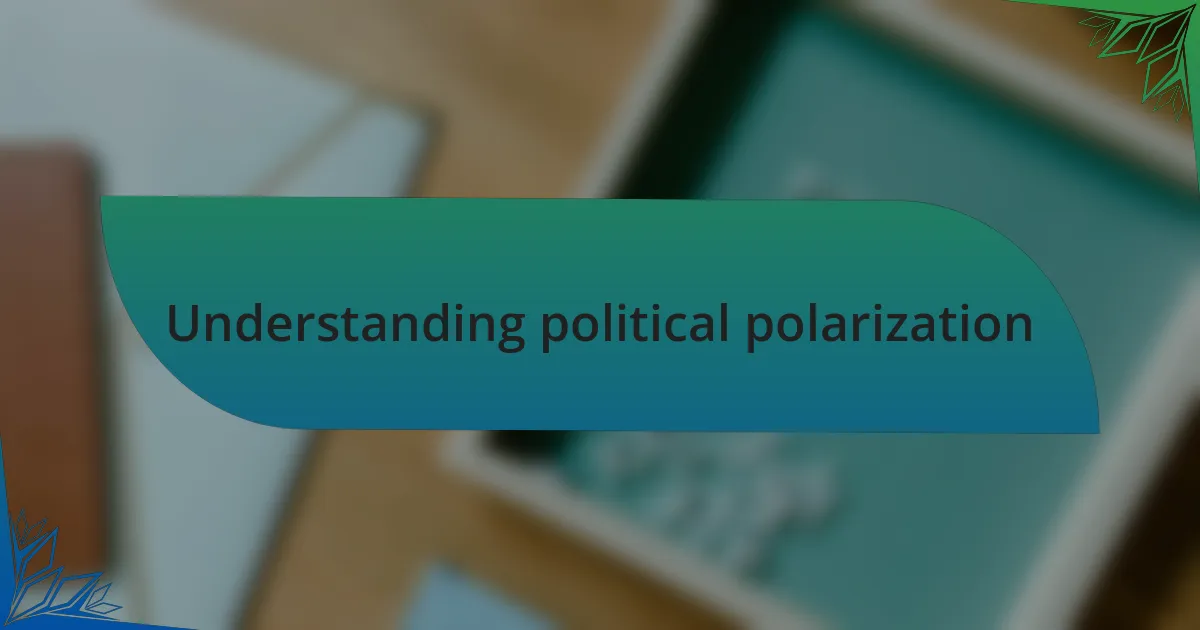
Understanding political polarization
Political polarization, at its core, is the widening divide in beliefs and values among different groups, particularly in the political sphere. I often find myself reflecting on conversations with friends who hold starkly different views. Have you ever noticed how discussing political beliefs can feel like navigating a minefield? It’s intriguing to see how passionately people defend their viewpoints while being completely unaware of how it affects their relationships.
The rise of social media has exacerbated this polarization, creating echo chambers where people only hear opinions that mirror their own. I recall a time I noticed a friend’s news feed filled exclusively with extreme viewpoints. It made me wonder: how can we foster understanding when we’re only listening to voices that validate our existing beliefs? This isolation can lead to an ‘us vs. them’ mentality that clouds rational discourse.
Understanding political polarization demands looking beyond simplistic labels to explore the underlying emotions and fears driving these divisions. I’ve had moments where I felt a mix of frustration and sadness as I watched friends argue fervently over political ideologies, seemingly missing a vital element in the conversation: empathy. Isn’t it fascinating how a simple understanding of each other’s stories could bridge the gap?
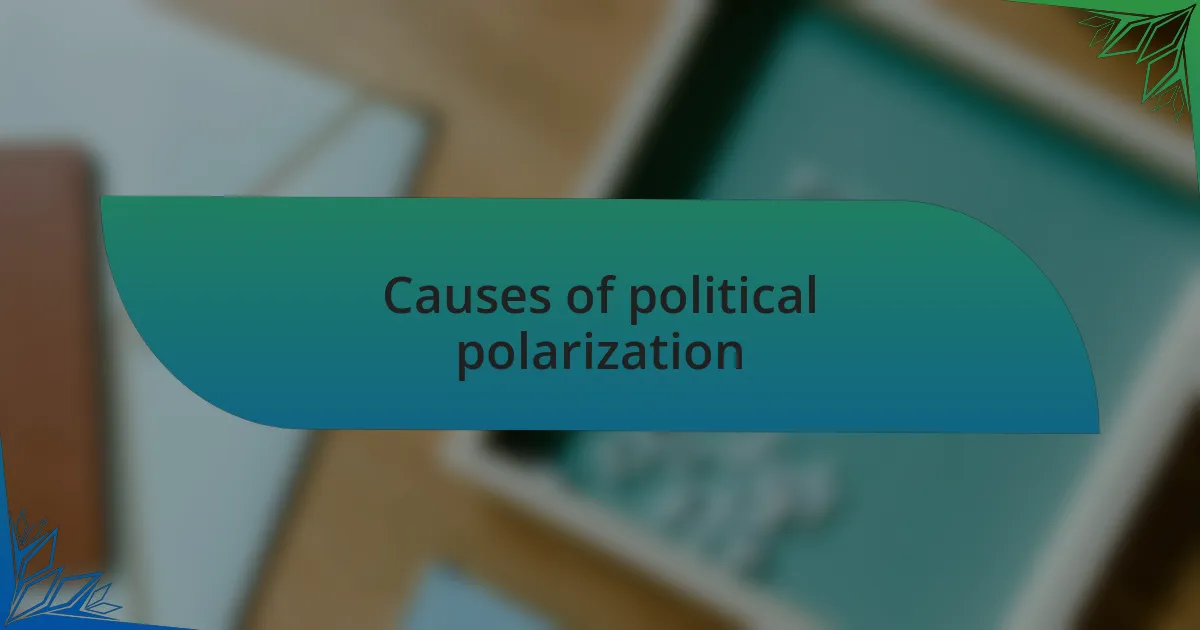
Causes of political polarization
The increasing political polarization can often be traced back to the growing influence of partisan media. I remember turning on my television one evening and being struck by how the news was presented in such a biased manner. It made me think about the power of narrative; when people consume information that aligns with their beliefs, it’s easy to see why they become more entrenched in their views. How do we break free from this cycle of confirmation bias?
Another significant cause is the changing demographics in society. I’ve observed how different generations view political issues through entirely unique lenses shaped by their experiences. For instance, younger people often prioritize climate change and equality, while older generations may hold firm to more traditional values. Isn’t it telling how our backgrounds influence not just our opinions, but also the way we communicate with one another?
Lastly, political identity has become intertwined with personal identity, amplifying emotions in discussions about policy and ideology. I recall a heated debate at a family gathering where simple political disagreements felt akin to personal attacks. It raises the question: how did we allow our political views to define us so deeply? This intertwining of personal and political not only intensifies conflicts but also creates barriers to understanding.
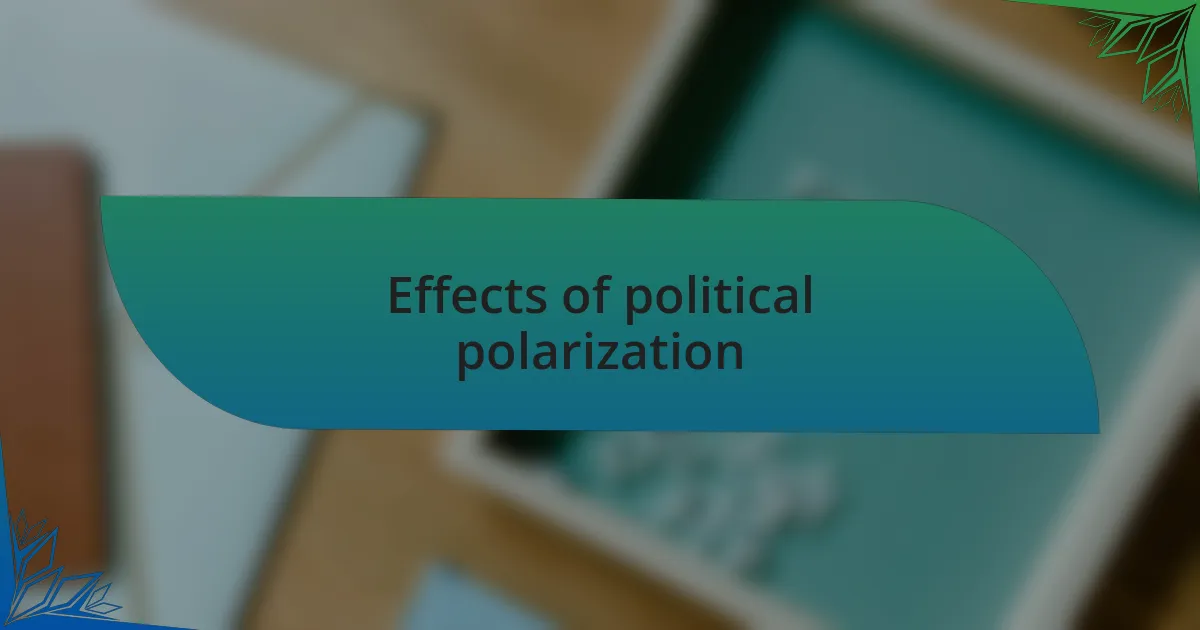
Effects of political polarization
Political polarization has a profound impact on social interactions and relationships. I recall having coffee with a close friend, and we hesitated to discuss politics, knowing our views might clash. This reluctance to engage in conversation reflects a growing fear of conflict, which can lead to isolation and weaken the ties that bind us. Have you felt this tension with someone you care about, too?
Moreover, political polarization breeds a culture of hostility. I witnessed this firsthand during an online debate about environmental policy, where respectful discourse quickly devolved into name-calling. It made me realize how easily our conversations can shift from sharing ideas to attacking opposing viewpoints. When did exchanging perspectives become a battleground rather than an opportunity for growth?
In workplaces and community settings, this division can stifle collaboration and innovation. I’ve noticed how team meetings often go off track when political discussions arise, leading to unproductive arguments instead of focused problem-solving. Is it so difficult to find common ground? I believe that our differing opinions could actually enrich our conversations if we approached them with curiosity and respect rather than an adversarial mindset.
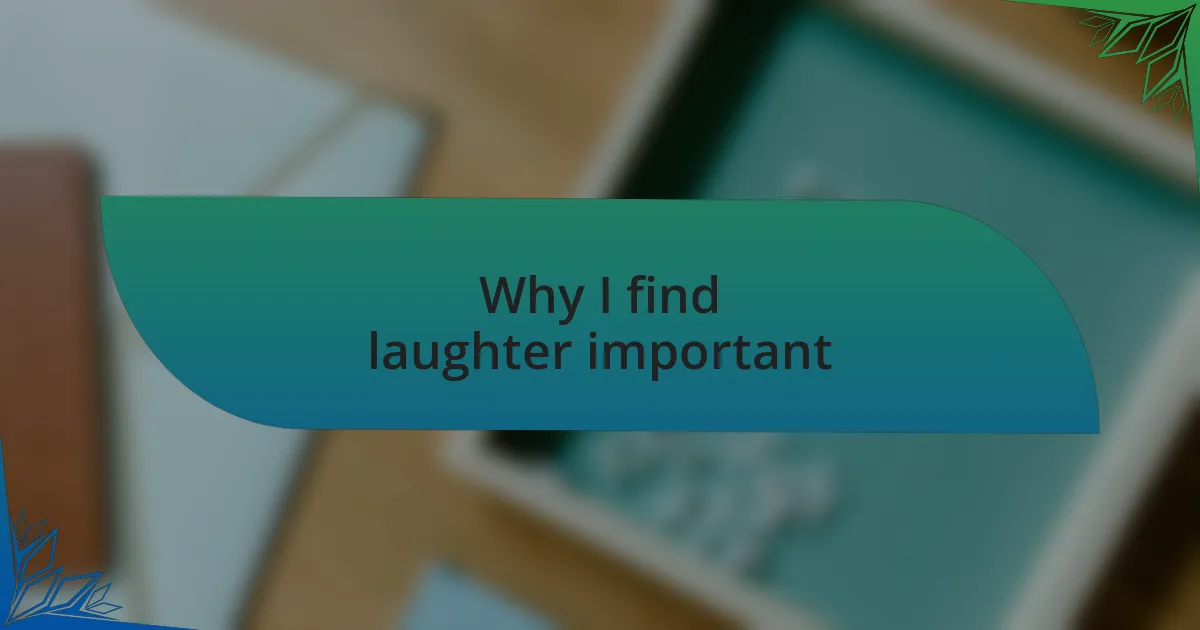
Why I find laughter important
Laughter serves as a powerful antidote to the stress that political polarization often brings. I remember a lively gathering where the conversation took a sharp turn to politics, and instead of tense debates, we turned to humor. Sharing a lighthearted joke about the political circus reminded me how laughter can diffuse tension and pave the way for open dialogue. Have you ever found that a funny quip can turn a disagreement into a moment of camaraderie?
It’s fascinating how laughter creates a bridge between people, even those with vastly different viewpoints. During a family dinner, my uncle and I found ourselves on opposite sides of an issue. Rather than letting that divide us, we exchanged playful banter about our positions. That shared laughter not only eased the friction but also helped me appreciate his perspective more. Can humor be the key to unlocking understanding in our divided world?
I often think of laughter as a reminder of our shared humanity. In online forums, I’ve noticed that when a serious discussion devolves into chaos, a well-timed joke can bring everyone back down to earth. It’s as if humor acts as a reset button, allowing us to reconnect as individuals rather than adversaries. Don’t you think we need more of that in today’s heated political climate?
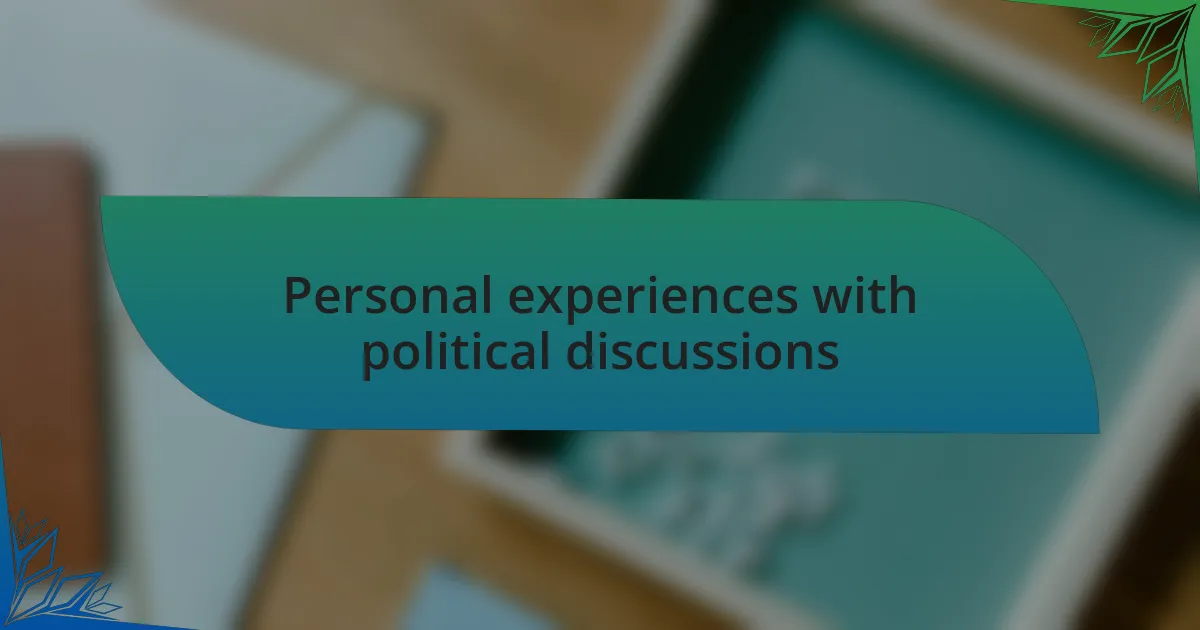
Personal experiences with political discussions
I remember a coffee shop debate where tensions were high, and opinions were clashing over the election. Instead of sinking into a heated argument, I recounted a hilarious anecdote about a politician tripping on stage. The laughter that erupted not only lifted the mood but also reminded us that at the end of the day, we’re all in this together, navigating a crazy landscape. Isn’t it refreshing how something simple can realign perspectives?
In another instance, I found myself in a book club discussion that took a detour into political territory. Instead of everyone taking rigid stances, we began sharing humorous stories about misunderstandings we had over the news. One member joked about accidentally liking a controversial post on social media. It was fascinating to see how our laughter spun a narrative of learning, turning a potential conflict into a space for growth. Have you noticed how humor can transform a rigid narrative into a shared experience?
I once attended a community meeting where differing opinions were creating an uncomfortable atmosphere. As discussions became increasingly fraught, someone made a playful remark about our local representative’s quirky fashion choices. Laughter ensued, and the tension faded like mist. It struck me then that moments like these highlight how, in the face of divisive issues, our ability to laugh together can foster connection. Isn’t it remarkable how humor often serves as a reminder of our fundamental desire for unity, even amidst discord?
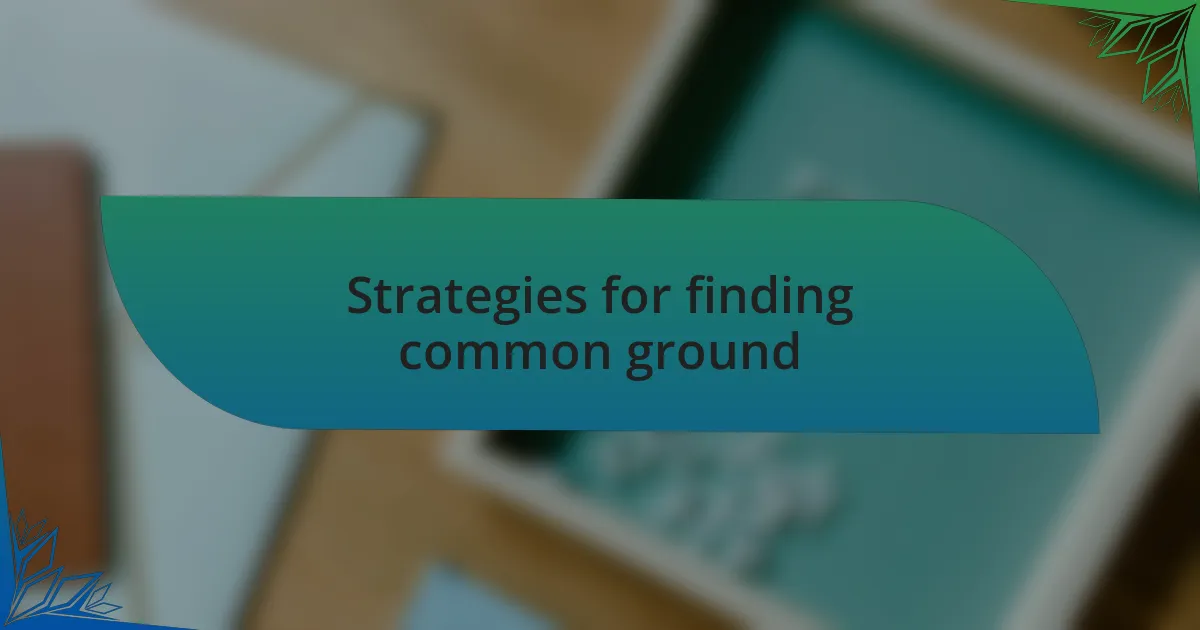
Strategies for finding common ground
One effective strategy for finding common ground is to shift the focus from political identities to shared values. I recall a discussion with a neighbor who held contrasting beliefs. Instead of arguing about policy, we explored what truly mattered to both of us—our families, our community, and aspirations for a better future. Suddenly, it felt like we were allies rather than adversaries, and that moment of connection was enlightening.
Another approach I’ve embraced is asking open-ended questions that encourage dialogue rather than debate. I remember chatting with friends during a barbecue when the conversation turned political. I simply asked, “What’s your ideal vision for our community?” That question sparked a thoughtful conversation about hopes and dreams instead of differences. It’s fascinating how curiosity about each other’s perspectives can lead to understanding and even collaboration.
Sometimes, I’ve found that sharing personal stories can bridge gaps in polarized discussions. During a family gathering, we unwittingly started discussing a contentious topic. I shared a relatable experience about a time when quick judgments led me astray in understanding someone else’s point of view. This vulnerability opened the floor for others to share their stories, reminding us that beneath our differing opinions, we all share human experiences. Isn’t it beautiful how storytelling can weave empathy into conversations?